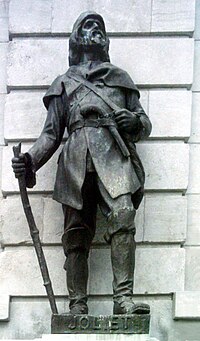Louis Jolliet
| Louis Jolliet | |
|---|---|

Alfred Laliberté's Louis Jolliet sculpture in front of Parliament Building (Quebec)
|
|
| Born |
September 21, 1645 near Quebec City, Canada |
| Died | 1700 (aged 54–55) en route from Quebec to Anticosti Island |
| Allegiance | New France (Canada) |
| Awards | Jolliet was granted land south of Quebec in return for his favours |
| Relations | Jacque Jolliet: Father |
| Other work | Canadian explorer |
| Signature |  |
Louis Jolliet (September 21, 1645 – last seen May 1700) was a French Canadian explorer known for his discoveries in North America. Jolliet and Jesuit Father Jacques Marquette, a Catholic priest and missionary, were the first non-Natives to explore and map the Mississippi River in 1673.
Jolliet was born in 1645 in a French settlement near Quebec City. When he was seven years old, his father died but his mother remarried a successful merchant. Jolliet's stepfather owned land on the Ile d'Orleans, an island in the Saint Lawrence River in Quebec that was home to First Nations. Jolliet spent much time on Ile d'Orleans, so it was likely that he began speaking Aboriginal languages at a young age. During his childhood, Quebec was the center of the French fur trade. The Natives were part of day-to-day life in Quebec, and Joliet grew up knowing a lot about them. He entered a Jesuit school as a child and focused on philosophical and religious studies, aiming for priesthood. He also studied music, becoming a skilled harpsichordist and church organist. Yet he decided to leave the seminary as an adult and pursued fur trading instead.
Jolliet attended a Jesuit school in Quebec and received minor orders in 1662, but abandoned his plans to become a priest in 1667. He spoke French, English, and Spanish.
While Hernando de Soto was the first European to make official note of the Mississippi River by discovering its entrance in 1541, Jolliet and Marquette were the first to locate its upper reaches, and travel most of its length, about 130 years later. De Soto had named the river Rio del Espiritu Santo, but tribes along its length called it variations of "Mississippi".
...
Wikipedia
